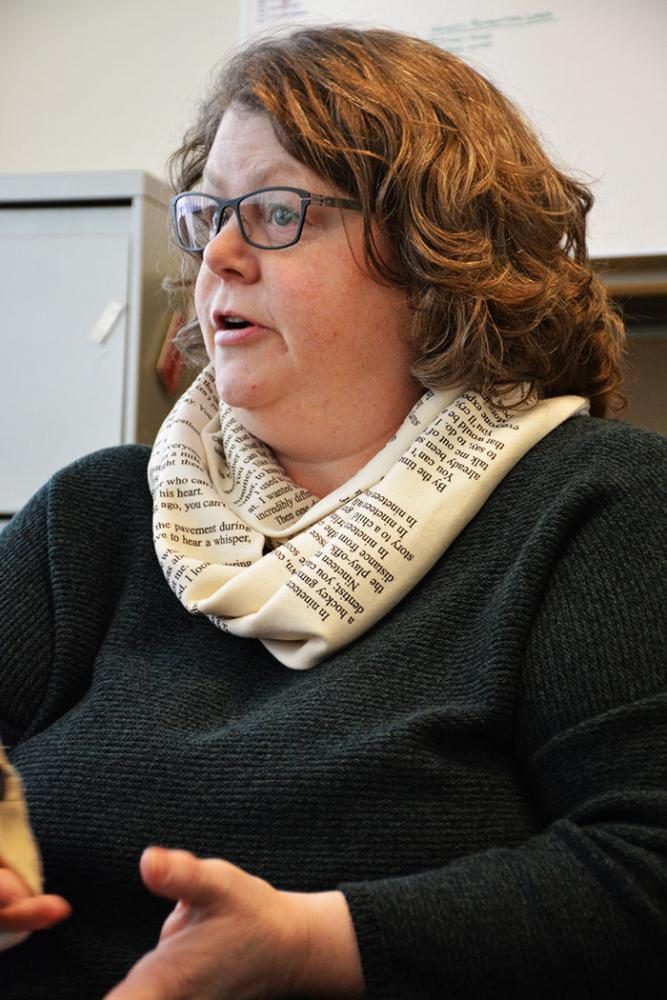Director of GIESORC to leave WSU
Heidi Stanton- Schebly has worked at WSU since 1998, most notably as the director of the Gender Expression/Identity and Sexual Orientation Resource Center. She is leaving WSU next semester to take a job at Eastern Washington University.
December 5, 2016
When Heidi Stanton-Schnebly first set foot on WSU for her job interview, she said the campus felt like home.
In 1998, she began as a residence hall director. Now, among other roles including interim director of the Women’s Resource Center, coordinator of the conduct administrative process, she is most notably finishing her career as the director of the Gender Identity/Expression and Sexual Orientation Resource Center (GIESORC), a position she described as her dream job.
After working here for nearly the lifespan of this year’s incoming freshmen, she is transitioning to become the Eastern Washington University Student Affairs/Student Life team’s associate dean of students. She will be in charge of supervising the PRIDE Center, the Multicultural Center, the Pence Union Building and Student Support and Advocacy.
Stanton-Schnebly said her role at EWU will be similar to the current one she holds at WSU.
“It’s all the things I have enjoyed doing,” she said. “I also get to grow those things. It’s really exciting to me to help to establish a multicultural center, taking that to the next level and continuing to advocate for students, continue to be humbled by their stories.”
She said the most rewarding part of any job she has held at WSU has been the opportunity to work with students through triumphs and frustrations.
“It’s those ‘aha!’ moments when you’re working with a student, and all of a sudden it clicks for them,” Stanton-Schnebly said. “Sometimes you won’t know for 10 years until you receive an email or card. Sometimes you never know and hope that you made a difference.”
Stanton-Schnebly was asked to be the assistant director for GIESORC in 2002, and then became its director in 2005. She said she stayed for as long as she had because of the community she found at WSU.
She is particularly proud of her role in establishing the Power of One, an LGBT student leadership conference. It began in 2004 with about 50 attendees, and has since grown into a regional conference housed administratively in the National Association of Student Personnel Administrators’ northwest region.
Two murals, one located on the second floor of the Student Recreation Center and the other in the CUB’s Quiet Lounge, were the product of her collaboration with artists and activists. Stanton-Schnebly said her work is centered around how people experience voice, presence and agency. Although she is leaving, her legacy lingers both on campus and, more importantly, within the people she has been able to help during her time at WSU.
Stanton-Schnebly’s compassion and empathy shines through to students with whom she works closely and shares strong relationships.
“One thing that is unique about Heidi is that she recognizes and celebrates the intersectionalities of all students,” said Dallas Blenz, a clerical assistant in GIESORC. “She genuinely cares about all identities which make up the student as a whole.”
Blenz worked with Stanton-Schnebly in the past semester to establish the student organization Queer in Science, Technology, Engineering and Math. The organization currently hosts STEM study sessions in GIESORC, and aims to address issues faced by queer students within STEM fields.
It’s important to not only hear what students are saying, Stanton-Schnebly said, but to really listen to their concerns.
As both an employee of the university and an advocate for students, she acts as an intermediary between two groups that may otherwise seem vastly distanced.
“As a campus, we need to have a voice that protects our students,” she said. “I know that students want that voice to be stronger. It’s a continual process. If people don’t understand how those policies work, it doesn’t matter because it’s not accessible involving students in that process of understanding how or why.”















